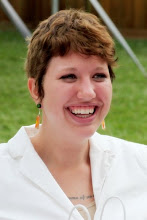On Sunday we cooked an "American style" Breakfast there which was a pretty big success. The food basically disappeared as we were setting it on the table and we were actually afraid we would run out before everyone got to eat! We made cheesy scrambled eggs, american bacon, fruit salad, pancakes, orange juice and coffee. Most of the people who came to the breakfast were germans, as its one of the programs that the MZT gears towards the german community here in Trier to try and get them to come and see what the center is all about, so that maybe they will be more interested in participating later. They also offer language classes in French, Arabic, Russian, Spanish, and English for the same reasons--once people walk in the door its very hard for them to leave. Moreover, part of creating a sustainable and tolerant community is providing services for everyone, not just those who are most oppressed.
I scrambled up and cooked 60 eggs plus cheese which was hectic and fun, especially since I was jacked up on strong german coffee. Then I went in and sat down with everyone else who was eating and got to have a pretty interesting conversation with a german man who was taking one of the arabic language classes at the center. Afterwards the beginning german students from App gave presentations about America and American culture and we left.
Sunday evening was a pleasant counterpoint to the morning. Instead of cooking, we were cooked for. Instead of serving, we were served. We took a bus to Luxembourg to visit Dr. Kennedy's nephew who runs a high end designer jewelry company. When we first got there he took us to their showroom and let us look around. Let me tell you: if you are ever wondering how to win a girl over, take her into a room where all four walls are covered with beautiful jewelry and hand her a glass of champagne! Then he took us into smaller room and let us see the new sample collections that won't be available until next spring which was a really cool experience. I felt like I was on Americas Next Top Model or some other show like that. The jewelry itself was beautifully designed and very unique. Moreover, it is made in the Phillipines by an all-women factory because the designer is a woman and wanted to make sure that her company--whose entire purpose is to make women feel beautiful--also empowered and supported women. In the Phillipines, having a job--whether it be as a secretary or a jewelry artisan--gives women the ability to support themselves and their families and not be dictated by their male relatives. They can choose who to marry or not to marry at all, where to live, what to wear, etc...The designer herself lives in the Phillipines and regularly visits the factory to make sure that everything is going well, which I really appreciated.
Afterwards we went to Angelo's(Dr. Kennedy's nephew) house and had a "BBQ"....uh...if you want to call lobster tails barbeque food! There was saffron rice, brie cheese, curried grilled chicken, fresh fruit, and more good wine than you could shake a stick at! Angelo's fiance, Serina, is from Iran and her mother, uncle and aunt were all there. Throughout the entire night Angelo and Serina walked around filling people's glasses and making sure everyone was having a good time. I got the opportunity to talk to an architect friend of theirs who lives in Luxembourg but is originally from Greece. She speaks fluent Greek, French, German and English and has been a vegetarian for 25 years. She was really funny and feisty and gave me recommendations of where to get good falafel in Trier!
However the highlight of my evening was definitely having the opportunity to talk with Serina's uncle who is a retired government advisor from Iran, before Ahkmenijad came to power. Although there was a pretty difficult language barrier because his english was so rusty, it was fascinating to discuss politics with someone so different from me. His wife was really adorable and in her even more broken english told me that she was really sorry she couldn't visit America, and I told her that I, too, was sad I couldn't come to Iran. We talked about the difficulties of creating cultural connections when governments are looking out only for their self-interests and the interest of gaining more power, not for their people. We discussed both american politics(is Obama a good president? can we tell yet after only 6 months?) as well as Iranian politics(the recent election, Mussavi, the riots, Ahkmenijad's regime) and also the issue of creating world politics and dialogue when people are coming from such diverse backgrounds and experiences.
After we finished talking one of my friends came up to me and said, "wow, I'm glad you finally escaped that."
"What are you talking about?" I asked. "That was the most interesting man I've talked to all night."
He didn't believe me. Which is why he certainly wasn't the most interesting person. However, it is really sad to me to see people missing opportunities to learn something new simply because the person who could teach them is older, or from another country or something. Although I know something about Iranian politics and culture, I certainly know a lot more, now. Moreover its always fascinating to discuss the world with someone who has lived in it for decades longer than myself. It is so easy to be shortsighted.
Anyways, today we are going to a wine tasting in the oldest wine cellar in germany, built when Trier was the capital of the Western Roman Empire. Then tomorrow morning early we get on a bus and go to Munich for a few days. We'll be visiting Neuschwanstein, Dachau(again), the Eagle's Nest, and some other cool places so hopefully I'll have some good pictures for you!

